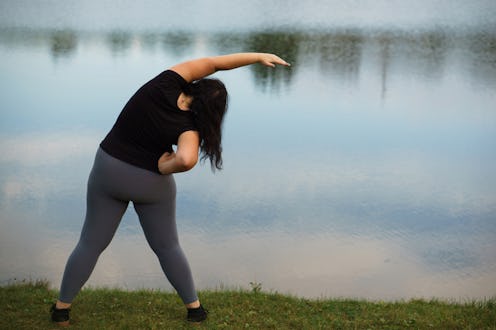Life
Literally Any Kind Of Exercise Can Help You Live Longer, New Research Says

If you’re new to working out, you might find the idea of starting an exercise routine daunting. And while it can feel tempting to skip the gym and stream Netflix instead, new research shows that even light physical activity can help increase your longevity. According to a new study published in the British Medical Journal (BMJ) literally any kind of exercise can help you live longer, regardless of how intense your workout is.
The current study also confirms what previous studies have shown: Staying sedentary for over nine hours a day (hello, desk jobs) can hurt your health. While researchers say that more evidence is needed to determine exactly how much exercise is required to protect your health, even light physical activities can help, according to a press release on the study.
In order to investigate the links between physical activity, intensity, and longevity, the research team conducted a meta-analysis of eight studies involving 36,383 adults. The subjects were all older than 40 years old, with an average age of 62. The study's authors compared levels of physical activity and time spent sitting with long term health outcomes. Activity levels were assessed from least to most active, and study participants were tracked for about six years, according to the press release. Researchers found that as physical activity increased, however moderately, mortality rates among study subjects went down overall.
Light physical exercise, such as keeping up with daily household chores and walking the dog, can help you live longer, The Guardian writes. Even if you’re not signing up for marathons yet, vacuuming your apartment and washing the dishes can help get your heart rate up. Basically, just getting up in the first place is a step in the right direction, the study’s authors say.
While these findings are encouraging when it comes to learning the benefits of lighter forms of exercise, there are some limitations to this research, according to the press release. All the studies reviewed were conducted in the United States or Western Europe, and only looked at adults older than 40. The findings may have been different if other populations, including younger participants, were included in the analysis.
Even as future research may help refine these findings further, it’s safe to say that there are really no drawbacks to increasing your activity levels, especially if you sit for long stretches of time every day. And if you’re just starting to get more physically active, knowing the value of even small improvements may help motivate you to get moving.
“This study reinforces the important message that getting the least active people to do even just a little bit more physical activity can have important public health benefits,” Dr. Gavin Sandercock, of the University of Essex School of Sport, Rehabilitation, and Exercise Sciences told The Guardian.
However much physical activity you like to do, know that you don’t have to push too hard to set yourself up for better health. Health and physical needs can vary. The key is to work out in a way that feels doable for you now, but also keeps you motivated to continue. Start where you’re at, focus on feeling more energized and healthier, and level up your activity when you feel ready to.